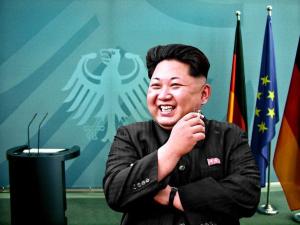This article was produced in collaboration with AlterNet and first appeared here.
Faced with an ever tougher economic sanction regime aimed at forcing the Hermit Kingdom to end its nuclear and ICBM programs, there are increasing signs that North Korea is using drug dealing -- among other illicit activities -- to earn hard currency. Such moves call into question whether economic sanctions can cause enough pain to the regime to force it to modify its behavior since the country's illicit economy is estimated to be larger than its licit one.

According to Deutsche Welle, which cites South Korean sources with covert contributors in the north, state-run trading companies have begun to manufacture and sell illicit drugs in a move to bust the sanctions regime. The companies have been "ordered to earn foreign currency" and, with legal means of doing so being constrained by United Nations export bans, they "are turning to drugs manufacturing on an industrial scale."
It wouldn't be the first time. The Kim dynasty ordered the production of opium poppies in the 1970s, with the harvest "sent to pharmaceutical plants" where it was "processed and refined into heroin… under the direct control and strict supervision of the central government," regime defectors reported. Drugs would be smuggled across the Yalu River into China, on commercial shipping bound for loosely guarded Southeast Asian ports, and inside the baggage of North Korean diplomats.
After 1998, as famine lingered and torrential rains ruined poppy fields, King Il Sung engineered a switchover of heroin labs to methamphetamine labs. Meth suited the regime both for domestic purposes -- it stimulated workers' energy while reducing their hunger -- and for its ability to generate hard currency.
Within a few short years, the value of North Korean drug production exploded, with the US-China Economic and Security Review Commission estimating that the country earned between $500 million and $1 billion from the drug trade in 2001 alone. A Congressional Research Service report seven years later concurred, also estimating the value of the trade at up to a billion dollars. By 2005, the Chinese were complaining about intercepted shipments of methamphetamine and MDMA being trafficked from North Korea.
Little has changed in the intervening years. North Korean meth is still making its way to China, according to journalist Brendan Hong.
"China has a major meth problem," he wrote last year. "It mostly comes from North Korea and it's been flooding northeastern China for years. I have seen workers abuse meth in Chinese electronics factories so they can stay awake when trudging through unending shifts. Cam girls (models who perform or strip online for a fee) and karaoke hostesses smoke it with their clients, who call the practice, "ice-skating.'"
"The North has a long track record of manufacturing and selling drugs overseas and it is a convenient fallback for the regime to ratchet up production when sanctions are stepped up and it is harder for them to export legitimate goods," said Stephen Nagy, a senior associate professor of international relations at Tokyo's International Christian University. "It is clear that they need hard cash for their new military gadgets and they know there is a big cash market for illegal drugs," he told Deutsche Welle.
North Korea appears bound and determined to become a nuclear state complete with the means to deliver atomic death and destruction across thousands of miles. And if it's got an illicit drug industry as big as its legal economy, sanctions aimed at legal sectors of the economy aren't going to rein in the regime. The primary result of increased sanctions may turn out to be making Kim Jung Un the Walter White of Northeast Asia.
This work by StoptheDrugWar.org is licensed under Creative Commons Attribution-ShareAlike 4.0 International
Comments
Gate keeper propaganda
You know its despicable that this purported anti drug war site publishes unsubstantiated propaganda claiming that North Korea is selling processed plants and synthetic drugs, but it does not levey teh same charges against teh USA. So sick of this USA gatekeeper propaganda that we get here in the first place.
Have you noticed that this site gatekeeps with marijuana being the limit of its advocacy?
In reply to Gate keeper propaganda by Bobby2 (not verified)
Bobby, our article does cite
Bobby, our article does cite sources on the North Korea claim, current and past episodes. If you have credible sources for information on US government drug dealing, share them with the class.
Dude I have been coming to
In reply to Dude I have been coming to by Cj (not verified)
CJ, there is more marijuana
CJ, there is more marijuana news on our web site because there is more marijuana news, and much of our web site is devoted to news reporting. A reasonable look at our web site and especially our advocacy programs does not justify your characterization of a "weed bias" here.
I've been reading the news
I've been reading the news from this site for 18 years. There is no weed bias, just comprehensive reporting on a wide range of drug policy issues.
In reply to I've been reading the news by no weed bias (not verified)
Thank you, No Weed Bias. :)Â
Thank you, No Weed Bias. :) (Not just for your comment, but for reading for 18 years!)
Drugs for nukes
Add new comment